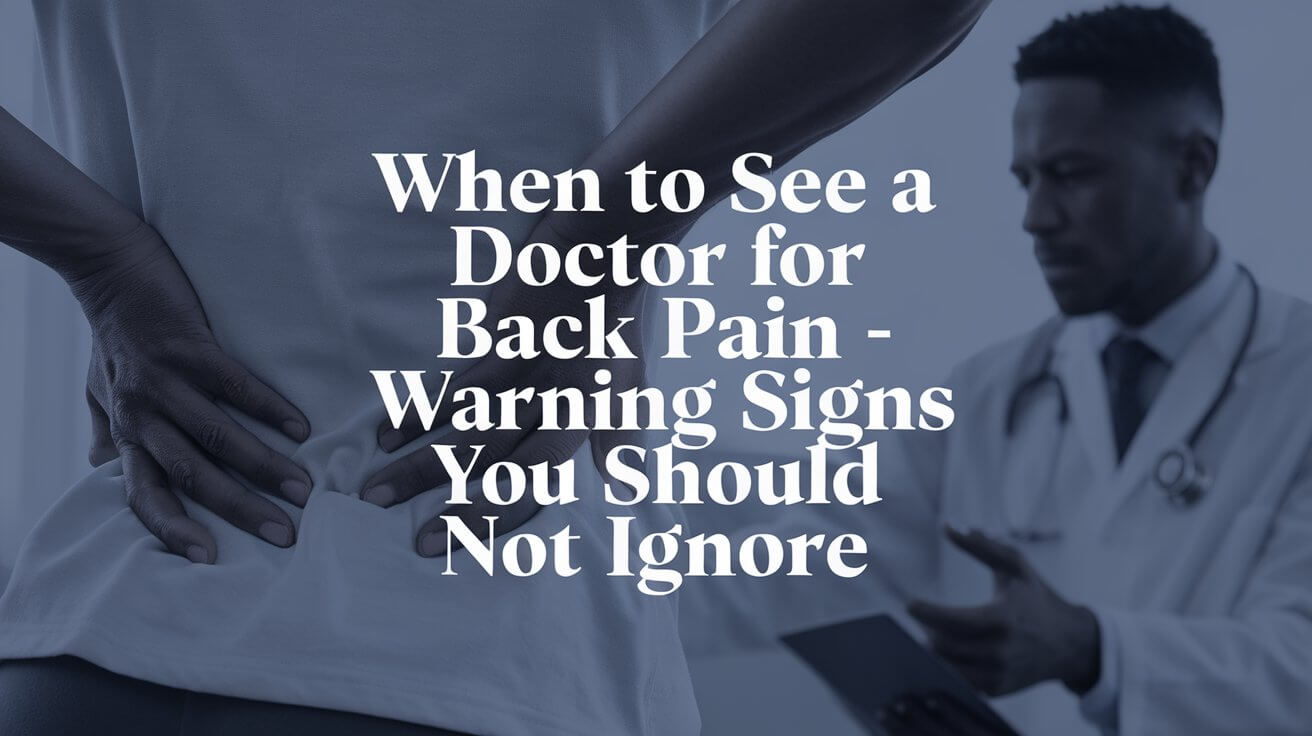If you are dealing with back pain and wondering whether it’s time to see a doctor, you’re not alone. Back pain is incredibly common and can range from mild discomfort to severe, debilitating pain. Like many, I used to think back pain was something I could manage on my own with rest and over-the-counter remedies. But I’ve learned that sometimes, back pain can signal something more serious.

In this article, I’ll share the key warning signs that indicate it’s time to seek medical attention for back pain. Understanding these signs can help you avoid delays in getting the treatment you might need.
Common Causes of Back Pain
Before diving into the warning signs, it’s helpful to understand the usual reasons people experience back pain.
-
Muscle Strain
Overuse, heavy lifting, or sudden movements can strain the muscles and ligaments in your back. -
Poor Posture
Slouching at your desk or hunching over your phone can put stress on your spine. -
Herniated Discs
When the soft material inside a spinal disc pushes out, it can press on nearby nerves, causing pain. -
Arthritis
Conditions like osteoarthritis or spinal stenosis can lead to chronic back pain. -
Injuries
Falls, car accidents, or other traumas can result in fractures or sprains in the spine.
While most back pain resolves on its own with rest, there are times when it could indicate a more serious issue.
Warning Signs You Shouldn’t Ignore
Here are the red flags that suggest you should see a doctor:
1. Pain Lasting Longer Than a Few Weeks
If your back pain doesn’t improve after two to three weeks of rest and self-care, it’s worth getting it checked. Persistent pain might indicate an underlying issue like a herniated disc or arthritis.
2. Severe Pain That Doesn’t Improve with Rest
Mild to moderate back pain often gets better with rest, but severe pain that doesn’t ease up could be a sign of a more significant problem.
Personal Note: I experienced this when I ignored back pain after lifting something heavy. It turned out to be a muscle strain that required physical therapy to heal.
3. Pain That Spreads to Other Areas
- Pain radiating down one or both legs might signal sciatica, often caused by a pinched nerve.
- If you feel numbness, tingling, or weakness in your legs, seek medical help immediately.
4. Loss of Bladder or Bowel Control
Sudden incontinence, along with back pain, could indicate a rare condition called cauda equina syndrome. This is a medical emergency and requires immediate attention.
5. Unexplained Weight Loss
Back pain accompanied by significant, unintentional weight loss might signal an infection or even cancer.
6. Fever or Chills with Back Pain
If you have a fever or chills along with back pain, it could mean there’s an infection in your spine.
7. Night Pain That Wakes You Up
Back pain that is worse at night and interrupts your sleep might indicate something more serious, like an infection or a tumor.
8. Recent Trauma or Injury
If you’ve had a fall, car accident, or another injury and develop back pain afterward, you should see a doctor to rule out fractures or other damage.
9. Pain in Younger or Older Age Groups
- If you’re under 20 or over 55 and experiencing unexplained back pain, it’s worth investigating further.
- In younger people, it could indicate conditions like scoliosis or stress fractures.
- In older adults, it could point to arthritis or compression fractures due to osteoporosis.
10. Sudden, Severe Pain After a Minor Activity
If you feel sharp pain after something as simple as sneezing or bending over, it might indicate a spinal fracture or herniated disc.
When I Decided to See a Doctor
There was a time when I ignored mild back pain for weeks, thinking it was just from sitting too much. Eventually, the pain became sharp and spread down my leg, making it hard to walk. That’s when I knew something wasn’t right. After consulting a doctor, I learned it was sciatica caused by a herniated disc. With the right treatment plan, including physical therapy and stretching, I was able to recover.
What to Expect When You See a Doctor
When you visit a doctor for back pain, they will:
-
Take Your Medical History
Be prepared to answer questions about your symptoms, lifestyle, and any injuries. -
Perform a Physical Exam
The doctor may check your posture, range of motion, and nerve function. -
Order Diagnostic Tests
- X-rays to check for fractures or arthritis.
- MRI or CT scans to identify soft tissue issues like herniated discs.
- Blood tests if an infection or another condition is suspected.
Treatment Options
Once the cause of your back pain is identified, your doctor may recommend:
1- Physical Therapy: Exercises to strengthen the back and improve flexibility.
2- Medications: Pain relievers, anti-inflammatories, or muscle relaxants.
3- Injections: Steroid injections for nerve-related pain.
4- Lifestyle Changes: Improving posture, losing weight, or modifying daily activities.
5- Surgery: Rarely needed but may be recommended for severe cases.
Tips to Prevent Back Pain
While some causes of back pain are unavoidable, you can take steps to minimize your risk:
1- Practice good posture, especially if you sit for long periods.
2- Stay active and strengthen your core muscles.
3- Use proper techniques when lifting heavy objects.
4- Invest in a supportive mattress and pillow.
5- Maintain a healthy weight to reduce pressure on your spine.
Conclusion
Knowing when to see a doctor for back pain is essential for your health and peace of mind. While most back pain resolves with self-care, certain warning signs should never be ignored. If you experience persistent or severe pain, don’t hesitate to seek medical advice.
From my own experience, getting the right diagnosis and treatment can make all the difference in your recovery. Taking care of your back now can prevent long-term issues and help you live more comfortably.
